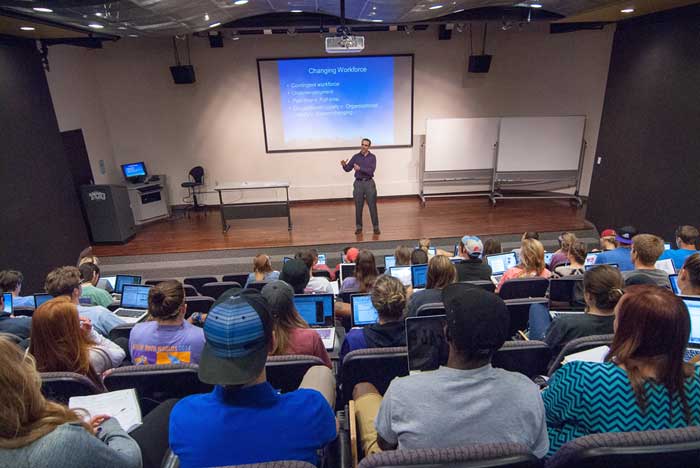Communication Studies
(BS, MS, Minor)

Bachelor of Science
Students in the Department of Communication Studies learn from a rich history of research and theory about human communication, and then leverage these insights to speak to pressing issues we face today. For majors, their academic journey focuses on key areas important for success in personal and professional life:
- Students often begin their journey in Communicating Effectively (COMM 10123), a general education course taken by almost all TCU students. Here, students learn and practice the ability to communicate a message in front of a live audience—a crucial, in-demand skill in the workforce, and especially in leadership positions.
- Next, studies in Interpersonal Communication (COMM 20113) and Communication Theory (COMM 20223) focus on communication competence in one-on-one situations, and also equip students with foundational knowledge for advanced classes in future semesters.
- Then, in Organizational Communication (COMM 30163), students learn how to communicate effectively in organizational life, including navigating group dynamics, overcoming communication barriers, and using communication channels effectively.
- In elective courses, students gain additional knowledge and skills in areas such as advanced public speaking, nonverbal communication and health communication.
- Finally, students take three senior-level seminar courses that push their knowledge and skills even further. Such courses may feature opportunities to conduct research with a faculty member, perform close analysis of communication scholarship or engage in project work that can be showcased in an online resumé.
In addition to our Bachelor of Science degree, a communication studies minor is also available.
Master of Science
Our award-winning graduate program facilitates learning in a small, connected cohort of students. Across two years, seminar classes equip students with a deep understanding of communication theory and with the analytical skills necessary to conduct independent communication research. Our graduate faculty are nationally recognized experts in their fields, with research productivity exceeding that of many top doctoral programs in communication. At the same time, they are caring mentors who enjoy supporting students toward their professional goals.
The department offers a limited number of assistantships to support graduate students. With an assistantship, students facilitate teaching in our undergraduate Communicating Effectively (COMM 10123) course. In addition to financial support, this experience equips master’s students with instructional, interpersonal and leadership skills.
The capstone of the graduate experience is either completion of (1) a research thesis under the direction of a faculty member or (2) written and oral comprehensive exams. Please read the full program requirements for more detail on these two options.
